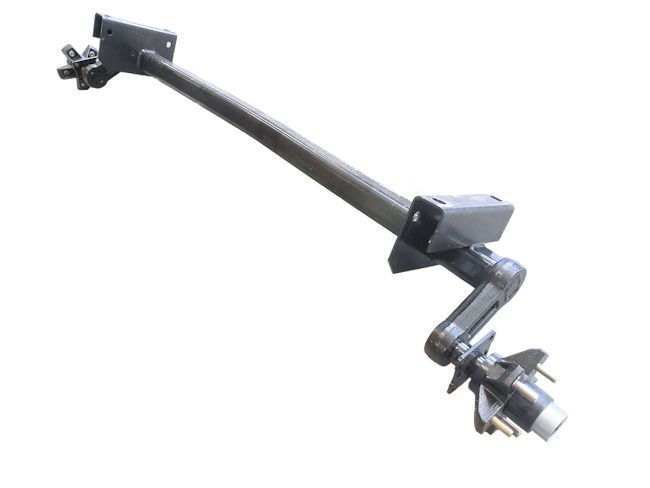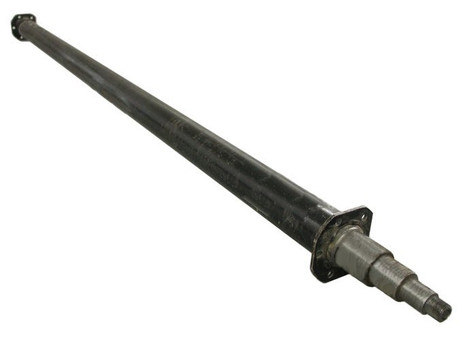Product Description
Axle 1.3t Torsion for Trailer Truck Half with Disc Brake Series with Break 500 Kg Stub Trailer Kits Car Motorcycle Parts Accessories Industry Manufacture
Product Description
Axle Data
Model:FANP1.3F5
Capacity (KG):1300
A(mm) Bracket distance:1618
B(mm) Track:2060
C(mm) P.C.D:Φ114.3
D(°angle:23
E(mm) Stud:5*1/2″*20 tooth
F(mm) Axle beam:80*80*4
Note:The dimensions could be changed as customers’ requirement.’
1.The axle tube was made by pressing the high strength alloy steel panel with the technique of submerged arc weld and the argon gas carbon-arc weld,which is highly strength, lower pressure, high loading and hardly deformed .
2.The spindle was made by alloy steel material and treat with fire treatment after solid forging. It has particular configuration of depressed forging and the high bend intension.
3.It was produced by Germany advanced technology, the axle design has patent and the axle can be welded with the axle together without any broken.
4.The bearing is the import or internal famous brand high loading product, it is wearable end has long life time. It is designed to be special tape and can reduce the stress focusing and increase the intension of fatigue..
5.The high performance of asbestos-free fiction has passed American test ,and it comply with environment code. It has the ability of wearable and high brake(ABS sensor can be optional).
6.Camshaft was forged integer, the numerical control machine can process the S curve with high precision, the surface was quenched intermediate frequency and is wear well.
7.The slack adjuster was forged integral with Germany Technology, small clearance and with high credibility to use (auto adjuster can be the optional).
8.Ductile cast iron wheel hub and the gray cast iron are all produced according the international standard. they has the ability of high loading ,wearable ,heat-resistant, and hardly deformed.
9.The axle assembly produced following the international standard, the types can be used commonly with BPM type and with high ability in changing, so they are easy to be maintained.
10.Tyre bolt and nut are forged according to the ISO and JIS standard with the alloy material, so they are safe and durable.
company information
/* January 22, 2571 19:08:37 */!function(){function s(e,r){var a,o={};try{e&&e.split(“,”).forEach(function(e,t){e&&(a=e.match(/(.*?):(.*)$/))&&1
| After-sales Service: | Installation Guide 1-Year Warranty |
|---|---|
| Warranty: | Installation Guide 1-Year Warranty |
| Type: | Custom |
| Loading Weight: | Custom |
| ABS: | Custom |
| Tent Type: | Custom |

How do trailer axles enhance the overall towing experience and safety?
Trailer axles play a significant role in enhancing the towing experience and safety in several ways:
- Load Distribution: Axles are strategically positioned to distribute the trailer’s load evenly. Proper load distribution prevents swaying, fishtailing, or trailer instability, ensuring a safer towing experience.
- Weight-Bearing Capacity: The load-bearing capacity of trailer axles is designed to handle specific weight limits. This capacity is crucial for safe towing, preventing overloading that can lead to accidents.
- Control and Stability: Axles with adequate weight capacity and the right placement contribute to better control and stability. They minimize the risk of losing control of the trailer, especially during sudden stops or maneuvers.
- Braking Systems: Many trailer axles are equipped with integrated brake systems or are compatible with trailer brakes. Braking systems enhance safety by allowing the driver to control the trailer’s speed and reduce braking distance.
- Suspension: Trailer axles often feature suspension components that absorb shocks and vibrations, improving the ride quality and overall control. This minimizes the risk of cargo shifting during transit.
- Maneuverability: Properly configured axles improve a trailer’s maneuverability, making it easier to navigate tight corners, reverse, and park. This is especially important for drivers when towing in crowded or confined spaces.
- Adaptability: Different axle types are designed for specific applications, whether for standard road use, off-road adventures, or marine environments. Using the right axles for the intended purpose enhances safety and performance.
- Corrosion Resistance: Trailers equipped with axles made from corrosion-resistant materials, such as galvanized or aluminum axles, are better suited for marine and coastal regions. They maintain their structural integrity and safety features even in corrosive environments.
- Load Balance: The axles’ load-balancing capabilities contribute to better trailer balance. Proper balance prevents overloading on one side and minimizes the risk of rollovers or accidents.
- Compliance with Regulations: Trailer axles must meet legal weight limits and safety standards. Ensuring compliance with these regulations is essential for safe and legal towing.
In summary, trailer axles are integral to a safe and enjoyable towing experience. They support load distribution, stability, control, and various safety features that prevent accidents and mishaps during towing.

What is the impact of trailer axle alignment on tire wear and performance?
Proper trailer axle alignment is crucial for tire wear and overall performance. Misaligned axles can lead to a range of issues:
1. Uneven Tire Wear:
– Axle misalignment can cause tires to wear unevenly. For example, excessive toe-in or toe-out (the angle of the tires relative to the trailer’s centerline) can lead to premature wear on the inner or outer edges of the tires. This not only reduces tire lifespan but also affects handling and safety.
2. Reduced Fuel Efficiency:
– Misaligned axles increase rolling resistance, which requires more energy to move the trailer. As a result, fuel efficiency can decrease, leading to higher operating costs.
3. Handling and Stability Issues:
– Axle misalignment can result in poor handling and reduced stability. Trailers may become more difficult to control, especially during braking and cornering, posing safety risks.
4. Overloading and Weight Distribution Problems:
– Misalignment can affect weight distribution. It may cause excessive weight on one axle, leading to overloading and potential legal issues. Balanced weight distribution is vital for safe and legal towing.
5. Axle Stress and Damage:
– Misalignment places additional stress on axles and suspension components. Over time, this stress can lead to component damage, potentially causing breakdowns and expensive repairs.
6. Trailer Drift:
– Misalignment can cause the trailer to drift or pull to one side, making it challenging to maintain a straight course, especially when driving at highway speeds.
7. Reduced Tire Lifespan:
– The combination of uneven tire wear, increased rolling resistance, and handling issues can significantly reduce the lifespan of trailer tires. This results in more frequent and costly tire replacements.
8. Safety Concerns:
– A misaligned trailer is less stable and more difficult to control, increasing the risk of accidents and compromising safety.
Alignment Solutions:
– To address axle misalignment, it’s essential to have the trailer inspected by a qualified technician. They can adjust the alignment by modifying the axle’s position and orientation. Precision alignment equipment is often used to ensure accuracy.
– Regular alignment checks and adjustments, as part of routine maintenance, can help prevent these issues and promote even tire wear and better performance.
– Properly aligned axles improve handling, safety, and tire longevity, making it a critical aspect of trailer maintenance.

Can you explain the various types of trailer axles and their applications?
Trailer axles come in various types, each designed for specific applications. Here’s an explanation of the common types and their uses:
1. Single Axle:
– Single axles have a single wheel on each side of the axle. They are often used in small utility trailers, boat trailers, and lightweight cargo trailers. Single axles are simple and cost-effective but may have limited load-carrying capacity.
2. Tandem Axle:
– Tandem axles consist of two axles placed side by side. They are commonly found in larger trailers, such as enclosed cargo trailers, car haulers, and camper trailers. Tandem axles offer increased stability and weight-carrying capacity.
3. Triple Axle:
– Triple axles feature three axles in close succession. They are used in heavy-duty and specialized trailers like large cargo trailers, mobile homes, and industrial transport trailers. Triple axles provide exceptional load capacity and stability.
4. Drop Axle:
– Drop axles are used to lower the trailer deck for easier loading and unloading. They are often seen in utility and equipment trailers. Drop axles are ideal for transporting vehicles and equipment with a low ground clearance.
5. Idler Axle:
– Idler axles do not have brakes and are used on lightweight or small trailers where braking is not required. They are commonly found in landscaping trailers, small utility trailers, and some boat trailers.
6. Brake Axle:
– Brake axles are equipped with brakes to enhance stopping power and safety. They are used in trailers that carry heavier loads, such as enclosed cargo trailers, horse trailers, and RVs.
7. Straight Axle:
– Straight axles have a fixed, straight orientation and are common in most trailer types. They provide a simple design and are suitable for a wide range of applications.
8. Torflex Axle:
– Torflex axles use a rubber torsion suspension system, offering a smoother ride and improved load equalization. They are used in lightweight cargo trailers, horse trailers, and RVs.
9. Adjustable Axle:
– Adjustable axles have a movable spindle, allowing the trailer owner to adjust the ride height based on specific needs. These are commonly used in boat trailers, where submerging the trailer in water requires height adjustments.
– In summary, the choice of trailer axle type depends on the trailer’s intended use, load capacity, and specific requirements. Understanding the different axle types and their applications is essential for selecting the right axle for your trailer.


editor by CX 2024-03-01